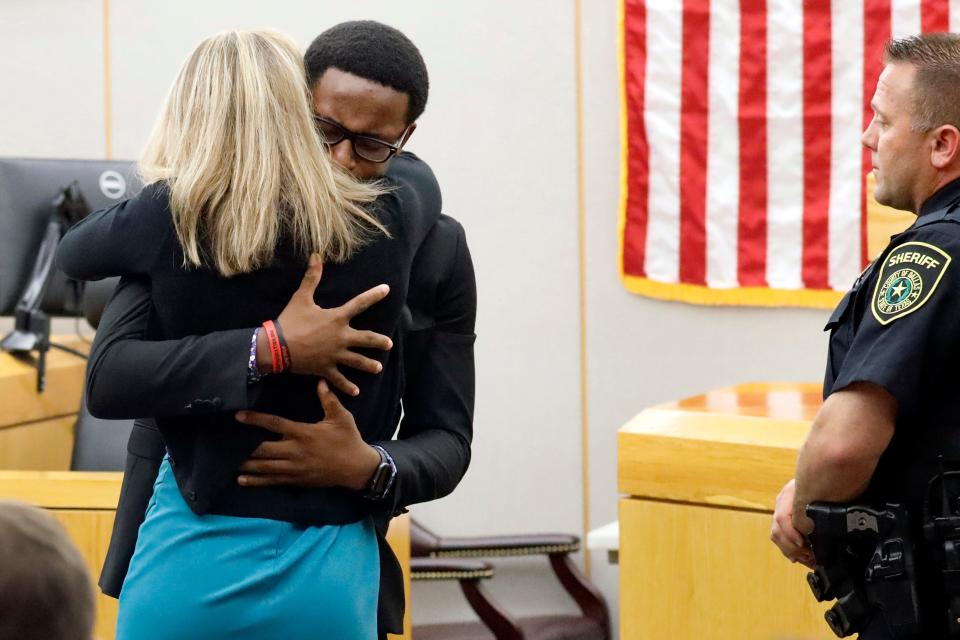For black shooting victims, sometimes anger (not forgiveness) is the best response
Convicted murderers don’t usually get hugs from the family of the victim. But last week, Brandt Jean explicitly told former Dallas police officer Amber Guyger that he forgave her for shooting his brother Botham and asked the judge for permission to hug her.
Judge Tammy Kemp, a black woman, stepped down from the bench and also hugged Guyger — and gifted her a Bible. The court officer (also a black woman) could be seen gently caressing Guyger’s hair.
CNN commentator and social justice activist Van Jones was “moved” by Jean's display of forgiveness.
Sen. Ted Cruz, R-Texas, took to Twitter to wax poetically about the power of Christian love and peddled forgiveness as the right response.
Jean has every right to do the thing that helps him heal and honor the memory of his brother. But in instances of unjust killings of black victims, why does the public laud responses of forgiveness and criticize those that include anger?

After the officer who killed Eric Garner with an illegal chokehold apologized, a member of the news media asked Garner’s widow, Esaw Garner, whether she “forgave” the officer. Her response of “hell no” was met with at least one headline that she was “lashing out” at the officer who killed her husband.
When survivors of the Emanuel African Methodist Episcopal Church shooting in Charleston, South Carolina, and the relatives of those killed during the slaughter took the stand during trial and expressed forgiveness to the man who massacred their loved ones, they were applauded for, in part, not turning to anger.
Those who forgive are held up as moral exemplars, while those who do not are seen as morally lacking. The greatest sense of moral failure is reserved for those who are explicitly angry in response to wrongdoing.
But anger can also be the morally correct response, praiseworthy in its own right.
In her fascinating exploration of contempt as a moral emotion, Macalester Bell writes in "Hard Feelings" that contempt can have important value. Contempt can serve as a form of protest, it can help us gain insight into our world, and it can motivate change.
As a philosopher who works in ethics, I have made my career thinking about how we place ourselves in the world and what kind of world is most conducive to human flourishing. This includes thinking about how humans respond to the things that happen around us.
Sometimes, emotions like anger (or contempt) are the exact right emotions to feel and to express. If anger can help us understand our place in the world and drive us to make the world that we occupy better, then good for anger. The most important feature of anger, properly directed, is the recognition that a wrong has occurred.
To the extent that one’s anger motivates one to right wrongs, anger can be a tool of achieving justice. In this sense, anger is also tied to self-respect. Anger is a recognition that one is deserving of just treatment and that one is willing to demand just treatment, even if the demand is ultimately unsuccessful.
The pressure for black people to be especially forgiving in the face of wrongdoing cannot be disentangled from a racist history that has generally met black demands for justice with violence. Stereotypes of black docility that go back to the days of the “happy slave” and continue presently with the “Magical Negro” primarily serve to make white people feel good about themselves.
It is telling that some groups of people in this country are not only allowed to be angry but also are praised for it.
Brett Kavanaugh’s red-faced denials of sexual assault during his Supreme Court confirmation hearing were widely praised (mostly by other white men) as the appropriate response to the “sullying” of his character. Meanwhile, Michael Brown’s stepfather (a black male) faced an investigation and had to apologize for his expression of anger after a grand jury announced there would be no indictment for his stepson's killer.
Even when anger is understandable or justifiable, it is not often regarded as praiseworthy, especially when that anger comes from black people. When one understands the expression of anger as, in some instances, a demand for self-respect, then it becomes clear why forgiveness is often seen as the only “right” response for black people.
In response to the stunning coincidence of prosecution witness Joshua Brown’s murder Friday, The Dallas Morning News called on the public to not lose what was “gained” from last week’s “heartening display of … forgiveness” by Brandt Jean. That’s not only a call against a rush to judgment. It is also a call against anger.
But if anger can fuel a push for justice for victims like Botham Jean, Joshua Brown and others whose names are known only to their loved ones, then anger is the exact right response. It is time for more people to be righteously and unapologetically angry.
Yolonda Wilson is a fellow at the National Humanities Center and an encore public voices fellow with the OpEd Project.
This article originally appeared on USA TODAY: For black victims, anger (not forgiveness) may be best response
